Stephen Roney's Blog, page 283
October 14, 2019
Turkey Hat
Something fun for Thanksgiving Dinner. Too late, I know, for Canada, but not for the US. And also great for Halloween.

'Od's Blog: Catholic and Clear Grit comments on the passing parade.

'Od's Blog: Catholic and Clear Grit comments on the passing parade.
Published on October 14, 2019 11:58
Thanksgiving
Boosted from a few weeks ago, more appropriate for today, Canadian Thanksgiving:
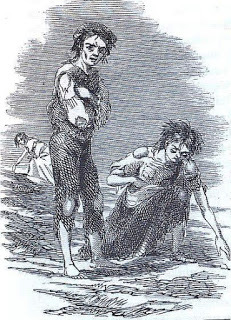 Irish ancestors, 180 years ago--the 1840s.
Irish ancestors, 180 years ago--the 1840s.It is worth remembering that a lot of things have gotten better in the world.
When I was young, Ireland was dirt poor. Ireland had always been dirt poor. All of Southern Europe was dirt poor. Even Scandinavia was poor. Mass starvation was more or less normal in India, Africa, or China. We were told the world was running out of food. It was only going to get a lot worse.
Famines are now increasingly rare: there has been a “green revolution.” India has been exporting food for some time; that would have been unthinkable not long ago. Ditto China, Thailand. The possibilities of GMO suggest greater abundance still is coming. Returning to Toronto after 25 years, it seems to me that, while the prices of some things have risen astronomically, the cost of food is not that different. We are evidently getting more efficient at agriculture, even in the developed world.
When I was young, a third of the world, by conventional reckoning, was behind the “iron curtain,” unfree, and a civilization-ending nuclear war seemed possible at any moment. Families built bomb shelters in their back yards. I remember the air raid system being tested in Montreal. That entire complex of concerns evaporated in about 1990, as though it had all been a dream—something almost nobody had imagined to be possible a few years earlier. Poland, Latvia, Bulgaria—all members of NATO and the EU.
Aside from the Communist world, when I was young, democracy was rare. Even in Europe, Spain, Portugal, and Greece were run by dictators. So was most of Latin America, and East Asia. Now most of these countries are functioning democracies, and the freedom tide seems to keep rising. We more or less assume now that it must eventually triumph everywhere.
Even a decade ago, we were supposed to be rapidly running out of oil. After which all the lights would go out. Tankerloads of cash were being floated annually from the West to dubious governments and unproductive economies mostly in the Middle East, much of it probably funding terrorism. And the Middle East was not a promising place to which to mortgage our future.
Now the US is the world’s largest oil exporter. Followed by Canada, with the fracking revolution barely begun elsewhere.
A lot of strategic headaches are therefore gone. If Iran were now to try to close the Straits of Hormuz, the old fear, the main loser would be Iran. Anti-American Venezuela is in economic freefall. Putin cannot count on the cash to fund his military adventurism to continue.
I remember back during the Iranian Revolution and the hostage crisis, Red Buttons did an over-the-top patriotic turn on American TV insisting that good old American ingenuity would someday solve the oil crisis. It looked then like vapid jingoism, wince-worthy; and it turned out to be exactly right.
In real terms, we are all clearly growing wealthier. Aside from food, I note that the price of cheap manufactured items, those little things you need around the house, is lower. I do not need to count the cost as my parents did before buying a new toaster. Improved technology, improved transportation, globalization—a lot of things are now made more cheaply in China, or India, or Southeast Asia.
Riding the bus today—and may I say, buses and streetcars are much more comfortable than they were in my childhood—I overheard a kid talking about her school’s recent trip to Costa Rica.
Costa Rica? When we had school trips, it was Ottawa or Quebec City. My grandparents’ idea of a big vacation was to get in the car and drive. Maybe as far as Virginia. If you ever made it across the ocean, you had made it, full stop.
In terms of entertainment and far more, the internet has improved our lives incalculably. They had radio and cinema and a phonograph, later black and white TV. With three channels to choose from. Now, whenever I need to know anything, instead of rummaging through libraries, perhaps even having to take an advanced degree, I can Google it up instantly. More often than not, I can even watch an instructional video—all free. It blew my mind the first time I was able to send an email to someone in Tokyo. Now I can move anywhere and remain in instant contact with friends everywhere. I can read or watch the news from any given city, generally free. I can also publish directly anything I choose to, in print or image or video, free. If anything happened anywhere, now, someone has a cell phone and is recording it, and it is quickly up online.
My kids cannot get interested in any toys or games or sports equipment we buy them; they sit in an unused pile, and we have learned to stop adding items. There is too much entertainment of all kinds on the Internet, free. We complain about their lack of activity, but really, the bottom line is that they have infinitely more options than we did. We were often bored. And beyond an internet connection, all this is equally available to poor kids.
The internet is also rapidly reducing the cost of many services; replacing older, more complicated systems. Uber makes transportation cheaper; AirBnB makes staying overnight in some new city cheaper. It has become dead easy and convenient to find a dentist. We probably no longer need such middlemen as real estate agents.
And smart phones. We forget how recently they arrived in our lives. Over just the last few years, smart phones have put all the world in our pockets, available at all times. Consider only the increased safety: lost? GPS. Fallen on a mountain hike in the wild and broken a leg? Call home; call emergency. Calculator, map, flashlight, translator, camera, video camera, always in your pocket. In China, you can make payments with your phone. In North America, debit cards serve pretty well; it was not long ago that I had to go to the bank weekly, stand in line, and withdraw the amount I thought I would need for the next seven days. While everyone else in town was doing the same.
And tablets. I did not at first see the point. Steve Jobs did. Tablets have vastly improved my own life. My daughter came to refer to my first ebook reader, which first allowed me to devour print from the net offline, as “Daddy’s toy.” Big enough to read on, small enough to curl up with, I am inseparable now from one tablet or another. So are the wife and kids.
When I was a kid, we still had the March of Dimes and Easter Seals, fighting for a cure for tuberculosis and polio. We kids all suffered through measles red and German, mumps, chicken pox, whooping cough, maybe three or four less common afflictions. My kids never had to bear any of that.
It is rather common suddenly for people to live into their nineties. We never expected this: seventy was a good run. My grandfather died at 61. And it may be uncool to mention it, but is how much better have some retirements become since Viagra appeared? It seems still only a few years ago. Nobody expected that one. In the nineties, everyone was terrified of AIDS: a rapidly growing plague, and a death sentence. Now we hardly hear of AIDS any longer; instead, of people “living with HIV.”
Despite the voices of doom that we always hear, and that we have always heard, the truth is that in material terms and in terms of comfort, life has been getting better and better for more and more people since the awful disruptions of the earlier 20th century. Which were themselves it seems only a temporary detour on a longer path of human progress that most of us used to believe in, and probably ought to again.
The downside, however, I think, is that as life gets easier and more comfortable, we all tend to forget the spiritual values. And in the end, we need them more than any material things. And suffer more from their lack.
Lord God of hosts, be with us yet--'Od's Blog: Catholic and Clear Grit comments on the passing parade.
Lest we forget. Lest we forget.
Published on October 14, 2019 06:20
Parties and Ideologies: Who's Who at the Zoo
 Your conservative candidate.As we get close to the Canadian federal election, pal Xerxes laments that party labels are no longer meaningful. Nobody seems ideologically consistent.
Your conservative candidate.As we get close to the Canadian federal election, pal Xerxes laments that party labels are no longer meaningful. Nobody seems ideologically consistent.Certainly true; in electoral politics, things easily get elastic. Ideology probably matters less than getting on the right side of an issue identified by recent polling.
But some of the confusion can be clarified by realizing that the various parties have come to be mislabeled. The conservative party in Canada is the Liberals; the liberal party is the Conservatives.
Xerxes writes:
“In a leaders’ debate this week, the Greens came across as more conservative than the Conservatives -- at least the Greens are trying to conserve something.”
Exactly right. “Conservatism” automatically means “conservation.” Conservatives in the true sense have always been the political group that cared about preserving the natural environment, as a shared heritage. It was Teddy Roosevelt who created the national parks in the US, and Sir John A Macdonald in Canada. For many years, the head of the World Wildlife Fund was Prince Phillip. It is an intrinsic part of the conservative philosophy to conserve nature. Animal rights, too, tends to be a natural conservative concern; today it is represented by the Greens.
 Your liberal candidate.The Greens, in other words, are indeed a conservative party. But recently these ideas have been identified as leftist.
Your liberal candidate.The Greens, in other words, are indeed a conservative party. But recently these ideas have been identified as leftist.Not that liberals would be opposed to a clean environment. But they would generally prefer to leave such things to market forces and non-government initiatives—it is not a core mandate of government.
“The supposedly socialist NDP isn’t threatening to nationalize anything. Justin Trudeau, on the other hand, has already nationalized a pipeline.”
Exactly. Nationalizing a pipeline—direct government involvement in the market—is against liberal principles. It might be Marxist; but would fit as well with traditional conservative values. Conservatism holds the national interest to be part of government’s mandate, wherever that leads; so this justifies such government intrusions in the market. Just as it justified Conservative government involvement in building the old CPR. Or Disraeli getting the British Tory Government to build the Suez Canal, or Roosevelt the US Republican administration to build the Panama Canal. A classically conservative act.
And that is exactly the rationale the Liberal are using—the classic conservative one.
The NDP has been deliberately mislabeled from the start. It is or was, indeed, as Xerxes says, a socialist party. Not Stalinist, but democratic Marxist, after Bernstein. “New Democratic Party” is a fudge, for a party that should more clearly have been named “Socialist” or “Social Democratic.”
Xerxes is right too that, properly, it should therefore be calling for nationalization of the means of production. But when did it last do that?
Strip this out, and what is left is another conservative party, with the same platform as the Liberals. Or, given that it now apparently believes in leaving the means of production in private hands, while heavily regulating it to enforce national goals, perhaps the NDP is closer to being Canada’s fascist party.
 Your fascist candidate.Still Marxist, then—Mussolini was a Marxist.
Your fascist candidate.Still Marxist, then—Mussolini was a Marxist.Xerxes:
“Conservatives may be opposed to government, in principle. But if elected, they have never declined to become a government themselves.”
Xerxes does not understand liberalism. What he describes here is anarchism. Liberalism is not against government, but sees government as having a specific mandate. It can therefore be either too big or too small.
Xerxes:
“In practice, when conservatives govern [sic—he means Conservatives, with the capital letter], they don’t reduce government. At least, not much. They divert tax resources to different areas. To more rigorous law enforcement, for example. To bailing out banks, or carmakers, considered too big to fail. And to the military. Currently, I read, the U.S. government uses 20% of its total budget to pay for its war equipment and personnel -- all tax funded.”
This illustrates the liberal understanding of government’s mandate: it is to protect the rights of citizens. Accordingly, expenditure on law enforcement and the military are legitimate.
Bailing out carmakers or banks, on the other hand, is not legitimate. While, granted, Conservative governments in Canada, and Republican administrations in the US, have resorted to such bailouts, they are more reluctant to do so than the Liberals or the Democrats. They at least lean more liberal. Witness the Liberal Party’s longstanding support of Bombardier, or SNC-Lavalin, let alone the pipeline purchase. Or Obama’s wholesale bailout of GM in the US, opposed by Romney and the Republicans.
Let’s clarify definitions.
Conservatives will generally prefer a bigger, more intrusive government. Bill Davis’s Ontario Tories were still classically conservative. Conservatism, following Burke, sees the state as an organic entity, more or less on the model of a family. “Paternalistic government” is baked into the mix. Government can be as big as seems useful.
Liberalism, on the other hand, as the name implies, starts from the premise of liberty--that is, the rights of the sovereign individual. Government has a specific and defined role, the protection of rights, and may not legitimately overstep these bounds. The US Declaration of Independence is a good primer here.
And surely by this you can see that the current Canadian Conservative party is liberal, and the Canadian Liberal Party is conservative.
The first and critical shift in the proper naming of names probably came with the New Deal in the US, and King’s copycat initiatives in Canada. In the early years of the Great Depression, the traditional political theories seemed to have failed. In desperation, and directly against the platforms they had run on, FDR and King reached for any new ideas that might be around. Most prominent among them were, of course, Marxism and fascism. This was the New Deal.
But admitting that these new approaches were either Bolshevik or fascist was not going to play well in Medicine Hat or Peoria. “Liberal” was a safer label for electoral purposes; especially after the Second World War. It was a “new liberalism.”
True liberals, precisely because their own philosophy was diametrically opposed, were over time forced out of the Liberal Party, and the Democrats, and needed a new home. They found it by default in the conservative parties, and over a longer period they came to dominate them.
 He never identified his party as "conservative."Manning’s Reform Party was pretty classically liberal, and was bizarrely branded as to the right of the Tories. Then they managed a hostile takeover. Any traditional conservatives who linger in the Conservative Party are now, erroneously, called “Red Tories.”
He never identified his party as "conservative."Manning’s Reform Party was pretty classically liberal, and was bizarrely branded as to the right of the Tories. Then they managed a hostile takeover. Any traditional conservatives who linger in the Conservative Party are now, erroneously, called “Red Tories.” The Republican Part in the US similarly flipped over to liberalism with Ronald Reagan. The UK Tories flipped from conservative to liberal with Margaret Thatcher. At about the same time, by merger with the Social Democrats, the UK Liberals tipped over from liberal to conservative or Marxist.
Now the average Canadian large-l Liberal is even prone to call authentic liberals “fascists.” Although their human rights - individual liberties philosophy is probably the point on the political spectrum most diametrically opposed to Fascism. You want fascism, your best bet is the NDP.
Xerxes continues:
“Small-l liberals [sic] … focus on big corporations as the enemy. With good reason.”
This is a small-c conservative position. Conservatism, seeing society as organic, always suspects the profit motive. Government is best left to those whose eyes are not habitually focused on the balance sheet—traditionally an idle ruling class freed from financial concerns and schooled to the job, more recently a credentialed professional elite. Who are supposedly, if less convincingly, above caring about their own financial interests.
Mere tradesmen are always to be scorned. They do not have the proper breeding for the job.
One can see this underlying classism starkly in left-wing reactions to Donald Trump. He is a mere tradesman, lacking proper breeding. Much of the visceral hatred on the left for Richard Nixon or for Joe McCarthy was the same: they were not gentlemen. The problem was always style more than substance.
Over recent decades, this conservative distain for “the trades” has conveniently merged with Marxist theory, which blames our failure to achieve an earthly paradise on a bourgeois or “capitalist” class. Which may or may not actually exist in a meaningful sense.
If the wrath of the modern left is directed towards “big corporations” instead of the older “rich capitalists,” this is no doubt for two practical reasons. Firstly, such highly visible rich capitalists on the original Marxist model as we have tend to be Liberals and Democrats: the Zuckerbergs, Brins, Gateses, Bezoses, and so forth. They have, naturally enough, gravitated to the conservative side of the spectrum, which tends to preserve existing social structures and so existing privilege.
 The old Marxist stereotype of the "capitalist." Usually ethnically Jewish...
The old Marxist stereotype of the "capitalist." Usually ethnically Jewish...But, as they never tire of saying, a corporation is not a person. It is a vague entity. It has no public face. Politicians can attack “big corporations,” and sustain the illusion that no actual people are hurt. They are the perfect scapegoat.
Of course, in reality, a corporation is people. You further tax or shut down a corporation, and real people do indeed get hurt or pay: shareholders, employees, customers, suppliers, and the community. But this is only the same sleight of hand politicians always use by promising to spend more money here and there—the money always comes out of same other people’s pockets.
But this is also dishonest in another way. Behind this façade, as noted above, the Liberals and Democrats are consistently more closely allied with the big corporations and their interests than are the Conservatives or the Republicans: SNC Lavalin, General Motors, Amazon, Google, Solyndra, and so on.
'Od's Blog: Catholic and Clear Grit comments on the passing parade.
Published on October 14, 2019 06:13
October 13, 2019
Joker's Wild

The online buzz about the new Joker movie is at a level I have never seen before. It seems that it is in the crossfire of the culture wars. Leftist commentators hate it, so much that some are, being leftist, actually censoring the name in print. Supposedly this is because it might inspire violence. From the right. Violence from the left, of course, is not a problem. Rightist commentators praise it. Critics hate it. Fans love it.
I have not seen the film, and am not likely to see it in the near future.
However, from what I hear, I am unhappy about some of the messages the movie seems to convey:
1. that there is naturally a class conflict between the rich and the poor, that might ignite at any moment.
2. that poverty and abuse cause violence; violence is the expression of pent-up rage from the oppressed.
3. that the mentally ill are violent.
Number one above is a Marxist premise. This is the Marxist theory of class war. But it is at least as reasonable to see the natural interests of rich and poor as almost entirely the same. It is not helpful to stir up a fear of the poor among the rich on this basis; or, conversely, a hatred of the rich among the poor. It is no healthier than stirring up hatred against the Jews among the Aryans, by suggesting that open conflict might erupt at any moment. Do this, and it will inevitably be the weaker party that will suffer.
Number two is twofold. The poor may be more likely to use violence, because they have less to lose by it, and fewer alternate means. But that is a secondary consideration; it is not the cause, and distracts from the real cause. Poverty does not lead to rage or violence against those who are better off; ask a Franciscan. Envy does. The rich are probably more prone to envy others: they probably became rich because they were more invested in accumulating things.
Most poor people are strictly non-violent and honest. Poverty cannot be the critical factor leading to crime.
The thought that experiencing violence makes one violent is worse. It is a way of blaming the victim. In fact, those who have themselves experienced violence or abuse are less likely to be violent towards others. Survivors of the Nazi death camps did not become serial killers.
And being told you are garbage does not make you feel more entitled. It is more likely to make you think you are garbage.
Murderous psychopaths emerge among those who have been pampered and spoiled, not the abused. Both serial killers and Nazis tend to be middle class.
Number three is worst. The mentally ill face enough utterly unjust stigma, on top of their unspeakable suffering. It is like blaming crime on the lepers. It has been demonstrated repeatedly, as this article reminds us, that the mentally ill are no more violent than the general population.
In fact, the genuinely mentally ill are dramatically less likely to be violent than the general population. This is obscured by the arbitrary act of defining “personality disorders” as forms of mental illness. A “personality disorder” is simply a conscious choice to do evil. Accept it as a “mental illness,” and there is no room left for human choice: nobody ever chooses to do wrong. And if you define “doing bad things” as a mental illness, you are of course going to find that the mentally ill do bad things. You are simply saying the same thing twice.
But this is most cruelly unfair to the genuinely mentally ill. It is like blaming Gandhi and the Jews for the Second World War.'Od's Blog: Catholic and Clear Grit comments on the passing parade.
Published on October 13, 2019 13:12
Hell, Yes!
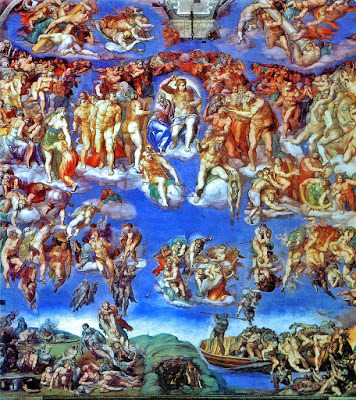 Michelangelo's Last Judgement.
Michelangelo's Last Judgement.Hans von Balthasar and Bishop Robert Barron argue the possibility that there are no souls in hell. Yes, there is a hell, and going to hell must be a real possibility, so long as there is free will, but maybe not ever an actuality.
Reportedly, Pope Francis himself told one interviewer that nobody actually goes to hell, that failed souls instead face annihilation at death.
There are reasons to suppose this is so, to, beyond wishful thinking. Why, after all, would a good God create a soul only for eternal suffering? Surely extended times in purgatory ought to be enough? What about God’s infinite love and infinite mercy?
But a view close to this one was ruled out as heresy very early on in Church history. The assertion that all souls eventually made heaven got Origen declared heretical.
The New Testament seems to say not only that some will go to hell, but that many will go there. This is the “broad gate”; “few are chosen.” Jesus tells the story of Lazarus, in which a rich man is in hell, and he seems to emphasize here that there is no exit, no way out.
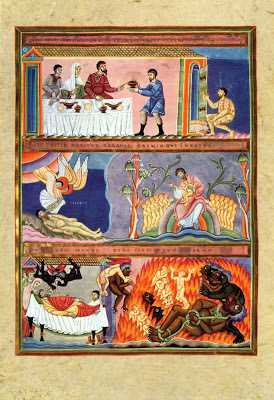 The Rich Man and Lazarus.
The Rich Man and Lazarus.“Then he will say also to those on the left hand, ‘Depart from me, you cursed, into the eternal fire which is prepared for the devil and his angels; for I was hungry, and you didn’t give me food to eat; I was thirsty, and you gave me no drink; I was a stranger, and you didn’t take me in; naked, and you didn’t clothe me; sick, and in prison, and you didn’t visit me.’
… These will go away into eternal punishment, but the righteous into eternal life.”
It may be possible to tease a different interpretation out of such passages, but the literal meaning seems plain.
In the visions of Our Lady of Fatima, the child seers reported seeing a great number of souls descending to hell.
“As Our Lady spoke these last words, she opened her hands once more, as she had done during the two previous months. The rays of light seemed to penetrate the earth, and we saw as it were a sea of fire. Plunged in this fire were demons and souls in human form, like transparent burning embers, all blackened or burnished bronze, floating about in the conflagration, now raised into the air by the flames that issued from within themselves together with great clouds of smoke now falling back on every side like sparks in huge fires, without weight or equilibrium, amid shrieks and groans of pain and despair, which horrified us and made us tremble with fear…. Terrified and as if to plead for succour, we looked up at Our Lady, who said to us, so kindly and so sadly: You have seen hell where the souls of poor sinners go.”
Fatima comes with some impressive miracles to attest to its authenticity, and is endorsed as genuine by the Church.
How can we reconcile this severity with a good and merciful creator?
According to Catholic doctrine, God sends no one to hell. Nevertheless, free will necessarily means that it is possible for some to choose to go to hell. Milton saw this when he had his Satan say “I would sooner rule in hell than serve in heaven.”
One can choose to turn away from God in a systematic, definitive way. All of us probably know someone who has. In a word, narcissists: we call people “narcissists” who choose systematically to put self above God, to think of themselves as godlike. This is the same pride we see in Milton’s Satan.
Heaven is the presence of God; hell is his absence. If they do this, they are choosing hell. And a hardened pride may indeed make this choice irrevocable.
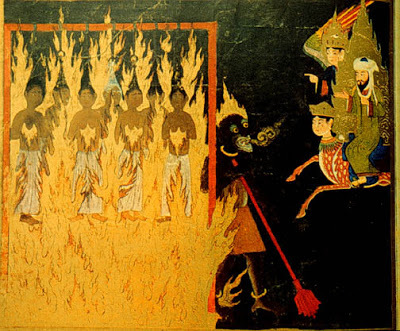 Muhammed Visits Hell.
Muhammed Visits Hell.What about atheists? You may ask. Is belief in God all that is needed? And are all atheists then condemned?
No; nominal allegiance to God, or to the person of Jesus, is not the issue. The New Testament makes this clear enough. Jesus condemns, and seems to assign to hell, the religious authorities of his day: these are the Pharisees. Conversely, even the demons he casts out acknowledge him as the son of God.
Remove, if you like, as atheists do, the notion of a personal God. The Logos remains: that is, the transcendentals, the Good, the True, and the Beautiful. These are God himself, as he manifests in creation.
A good atheist is an atheist because he believes this is the truth. If so, he is a true worshipper of Christ, the Logos. A good atheist is adamant that he is obliged to act morally. If so, he is a true worshipper of Christ, the Logos. Conversely, someone who declares himself a true worshipper of Jesus Christ, yet who is not genuinely convinced this is the truth, is a Pharisee, a hypocrite. He is a worshipper of Satan. Someone who declares himself a worshipper of Jesus Christ, yet who does not consider himself bound to act morally, is a Pharisee, a hypocrite. He is a worshipper of Satan.
And the same, perhaps less obviously, is true of beauty. One who genuinely values and seeks to preserve beauty is a follower of Christ; one who does not worships Satan.
Anyone, nominally Christian or atheist or Hindu, chooses hell if they deliberately turn away from truth, good, and beauty.
We all do, of course, some times. Having sinned does not send you to hell. Repentance, not sinlessness, is what separates the sheep from the goats. 2 Peter 3:9 speaks of God “. . . not wishing that any should perish, but that all should reach repentance.” A good person sins, even again and again, like Peter himself. But he admits he has sinned, and repents. A narcissist will instead insist he never has. He or she will, if necessary, deny the very possibility of good, or truth, in order to preserve the godlike delusion of self.
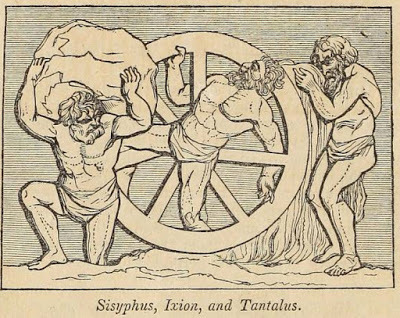 Sisyphus, Ixion, and Tantalus in the Pagan Greek Conception of Hell.
Sisyphus, Ixion, and Tantalus in the Pagan Greek Conception of Hell.Now, surely it is plain to anyone that a great many people are currently doing exactly this. It is the dominant doctrine among our educated elite. When a postmodernist says “there is no truth,” they are deliberately choosing hell in just this way. When they say that morality is culturally determined, purely a matter of group consensus, they have turned away from good. They have chosen hell.
Hitler, for one, barring some sort of last-second private repentance, is plainly in hell on these grounds.
It is also a commonplace among academics and others commenting on art today to reject the beautiful and seek the ugly. Much contemporary art is deliberately ugly. I hesitate to say this view is common among artists—I find in my own experience of practicing artists that it is not. It comes from elsewhere, from art criticism. And I expect it is not definitionally possible to be an artist without seeking beauty. Not the pretty or cute; beauty is something other than this, and must include the sublime. But if you simply set up a urinal on its side, and call it art, you are of the devil’s party.
Given all this, it seems obvious that a large number of people are indeed bound for hell.
Is it an absolute majority?
I think there are hopeful reasons to believe it is not. While the educated elite may be officially committed to postmodernism, the average person, having it explained, probably sees it as madness. These are the “little ones” Jesus praised in the Beatitudes. Even many of the “elite” are probably, like Nicodemus, in private dissent.
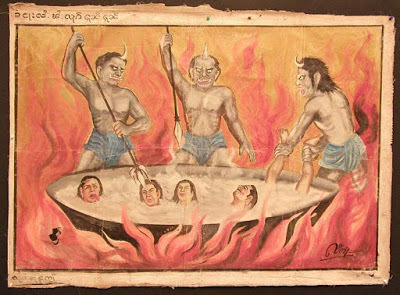 A Buddhist Conception of Hell.
A Buddhist Conception of Hell.When the Book of Revelations describes the cosmic war between the loyal and the fallen angels, it says that one third of the stars are torn from the sky: “Its tail swept a third of the stars out of the sky and flung them to the earth.” This may be a reference to how far evil can extend in cosmic terms. Beyond about that proportion, it tends to be self-defeating. If everybody lies, for example, lying is no longer of advantage. If everybody is out to kill everybody, there is no longer any crime of murder; killing is self-defense. If everybody steals at will, in effect, nobody has any property. And so there is nothing to steal. And so on: moral evil needs good, and good to predominate, in order to exist.
By this rule, which seems at least as solid as the law of gravity, up to one third of souls probably end up in hell.
'Od's Blog: Catholic and Clear Grit comments on the passing parade.
Published on October 13, 2019 08:07
October 12, 2019
Book Burning in Georgia
If this report is accurate, the actions of the students in burning books deserves our condemnation.
But it may also be evidence that the tide is turning. Straight white men in academics are perhaps no longer happy to sit still for being lectured on how evil they are.
'Od's Blog: Catholic and Clear Grit comments on the passing parade.
Published on October 12, 2019 09:46
Elton John Reveals His Problems with His Mother

Ordinarily I avoid celebrity gossip; it is usually the sin of calumny. However, our awareness of childhood abuse is growing, and more and more celebrities are opening up about their own experiences: Michael Jackson, Brian Wilson, Stefan Molyneux, and so on.
Each time one of these big names does, it reduces the oppressive social taboo that keeps us from dealing with the problem. And helping the young victims at the crucial time.
http://www.narcbrain.com/elton-john-brands-his-mother-a-sociopath-who-never-met-his-sons/
'Od's Blog: Catholic and Clear Grit comments on the passing parade.
Published on October 12, 2019 06:10
October 11, 2019
Election and Other News
The polls have finally begun to move. It looks as though this time, the debates were important. Votes seem to be shifting from the Liberals to the BQ in Quebec, and from the Liberals to the NDP in English Canada. This reflects the consensus among commentators on who did best in the debates.
The principal beneficiary is going to be the Conservatives, as the vote on the left splits more evenly.
In other news, Bernier’s PPC is taking heat because one of their NS candidates tweeted in 2017 that “Islam is pure evil.” Storm in a shotglass, it would appear. Candidate explains she failed to make the distinction between Islam and Islamism.
It would be fair comment if someone did consider Islam purely evil, mind. Islam is a set of opinions or beliefs. Just as we could honourably say “Nazism is pure evil,” or “Satanism is pure evil,” logically, we might believe this of Islam. But it would be political suicide. And of course, for the record, I would consider this wildly wrong. Islam is wrong on some things, but a force for good.
Islamism, on the other hand, is pure evil.
It would be tough for Bernier to dump her, in any case. This late in the campaign, it is not legally possible to replace a candidate.
In other other news, Star Metro reports Ontario students and parents protesting Doug Ford’s cuts to education. They are upset at a new requirement that four high school courses be taken online, and a rise in the number of pupils per class from 22 to 28.
As someone more or less in the education field, I feel this opposition is misguided. Although all educational studies are necessarily dubious, there is no good evidence that the number of students in a class affects student achievement. It affects the teacher’s ability to break classes into small groups instead of lecturing. But some of the most popular courses at university level fill huge lecture halls.
There is no evidence either that breaking students into small discussion groups leads to better learning than a lecture. There are theories to support this claim, but no actual empirical evidence.
Perhaps it is more significant that lecturing requires more work by the teacher than having students break into small groups and discuss. As a teacher, I love such group discussions.
As a student, I always felt I learned more in a lecture.
Such studies as have been done also suggest that online courses teach more efficiently than conventional classrooms. And there are reasons to expect this to be so: online a student is able to work at their own pace, potentially has access to a variety of different forms of presentation, text, audio, images, video, interactive, animated visuals, and instant search, and can back up and try again if they miss something.
This is not to say that there is no value in the physical presence of a teacher, or of other classmates. Best results are obtained by “blended learning,” combining online with classroom. But students are gaining, not losing, on balance, if the choice is online versus conventional class.
The problem with online learning is that it automates so much of the process; over time, fewer teachers are needed. This is of course not good for teachers. Moreover, in my experience, most teachers are confirmed Luddites. They are afraid of the new technology, and will not use it if not forced. With some reason: inevitably, the students are better at it than they are.
So why are students and parents protesting?
Perhaps because they are too inclined to accept the authority of teachers as the “experts.”
But for students, it may also be a matter of not daring to alienate your own teacher. That could be risky.
'Od's Blog: Catholic and Clear Grit comments on the passing parade.
Published on October 11, 2019 14:56
October 10, 2019
Are the Winds in Canada Shifting?
Seems like I scored a clear miss on my reading of the recent Canadian leaders’ debate. I thought Jagmeet Singh did not do what he needed to do. But it seems to be the consensus among the pundits that Singh was “the winner.”
Mainstream media left-wing bias? But Steve Paikin had a pollster reporting the same, based on overnight polling. It seems it was I who was blinded by ideological bias.
I agree that Singh scored for being likeable. I just did not think that mattered, because for likeability he was ideologically up against Elizabeth May, who is more so. So that, I thought, was not going to sway votes.
The pollster says it has.
Partisans of Scheer need not panic, however. This should be good news for them. Singh pulls votes from the Liberals, for the most part. A more even split between them lets the Tories take more ridings. Singh would have a lot of ground to make up before he actually challenged for power.
But buoyed by my wrong call here, let me make another.
I have a vague sense that we have come to an inflection point in the campaign, and in Canadian politics. Possibly even a watershed.
I mean the recent video of Antifa members harassing an elderly woman with a walker who was trying to attend a Bernier event in Hamilton. They blocked her way; they loudly chanted “Nazi scum! Off our streets!”
Note that the clip featured here is from RT, Russian TV. It is getting international attention.
It may have pulled the claimed moral high ground out from under the forces of “progressivism” in the public mind. The absurdity of the charge was too apparent. It was too apparent who was the bully, and who the bullied. Mainstream media reports have tried to obscure it, but the video itself was too vivid.
Someone was then able to ID one of the Antifa members in the video, and outed the man behind the mask on YouTube. He turned out to be a recent (2015) Syrian immigrant. Who, we are then shown, has a history of rioting.
https://www.facebook.com/rick.boswick/videos/2667612919944522/
The optics could not have been better for Bernier’s cause: a recent immigrant from Syria, of all places, declaring exclusive ownership of the streets of Canada, showing hatred towards a native-born Canadian simply exercising her democratic franchise. And a little old disabled lady, at that.
“They hate us, they are violent, they lack all humane instincts, and they plan to take over.” That’s the visual message.
His family runs a restaurant on Queen West. More bad optics, violating the popular meme of destitute Syrian refugees. Looks like they were economic migrants after all.
Said restaurant was soon identified, as it bore the suspect’s family name, and some online called for a boycott.
Within days, the family announced the restaurant’s closing. They said the hostility they were getting on social media was apparently too much.
Doxxing is immoral. The family, as opposed to the individual, may bear no blame.
On the other hand: the perp was wearing a mask. Like the masks once worn by the KKK, almost demands a public unmasking.
And was this deliberate doxxing? Or was the matter simply self-evident by the restaurant’s name?
It was the family’s decision to close the restaurant. Nobody else made them do this, and so nobody else may deserve any blame for it. Obviously, they had suffered some very bad publicity, very likely to harm their business. Welcome to the free market.
Some were calling for a boycott. Okay: the left has made boycotting businesses for the slightest of reasons standard practice. It is something right-wingers have long just had to live through.
Did they get death threats? Any prominent figure on the right has been getting death threats for years.
The message the closing of the restaurant conveyed seems to be that the left has a glass jaw.
I think some people on the right now smell blood. And some on the left are smelling their own.
Predator may suddenly be prey, and prey may now need to be reckoned with. They, these despicable “right-wingers,” may be really angry, it seems, and not inclined to just take it anymore. It’s no longer going to be just fun for the left.
It’s probably nothing, as Kate McMillan would say.
But I attended a local all-candidates rally a couple of weeks ago, I think the day after the video surfaced, and then another just last night. The same set of candidates. At the first, the other parties tried to hammer the PPC to death, with their verbal bicycle locks, for their stand on immigration and on climate change. I noted pushback from some in the audience then. I thought I detected surprise in the candidates. Their expected applause lines were suddenly drawing flak. They seemed to pull back for the rest of the night.
Politicians are always brave at attacking nonexistent or absent enemies. But they are not going to oppose anyone real to their face. They might have a vote.
Last night, nobody took a jab at the PPC. The unkindest cut was just the Liberal saying he had no idea how they planned to finance their promises. That seemed a backhanded compliment. It was as if suddenly they were understood as an otherwise appealing electoral option.
Aside from the Liberal, none of the other candidates, all further to the left, even referred to the PPC or their stands on the issues. It was as though they were afraid to test those waters; afraid that if they made their disagreement plain, it might lose them support.
Meantime, Andrew Scheer just announced a new tougher stand on turning away refugees at the border. His pollsters may have told him something. Until now, he has been triangulating to the left.
It is all unrepresentative, anecdotal, and mostly just my sense of smell. Which has recently been proven unreliable.
Make of it what you will.
'Od's Blog: Catholic and Clear Grit comments on the passing parade.
Published on October 10, 2019 06:54
October 9, 2019
This Way Madness Lies
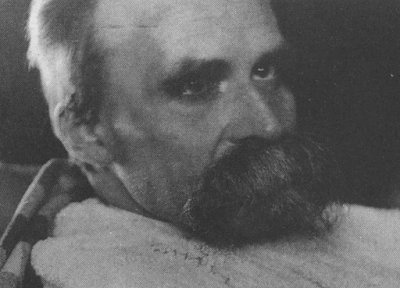 Nietzsche mad.My portside pal Xerxes proposes one essential rule for open discussion: never drag in an external authority. He objects specifically to looking to the dictionary for definitions of words, quoting the Bible, or quoting any famous writer. He mentions here Nietzsche, or Kant, or Confucius.
Nietzsche mad.My portside pal Xerxes proposes one essential rule for open discussion: never drag in an external authority. He objects specifically to looking to the dictionary for definitions of words, quoting the Bible, or quoting any famous writer. He mentions here Nietzsche, or Kant, or Confucius. This is indeed the spirit of the age. This is the postmodern spirit. It is surely the spirit that has us all pulling down public statues.
I have seen it too in Adult Children of Alcoholics. They began with much promise in the 1980s; in more recent years they have fallen into decline. And I think it is precisely because they embraced this rule from the start. Everyone gets to speak “their truth” at a meeting, and nobody is supposed to “cross talk.”
And so nothing is ever resolved. People seem to hang in, hopefully, for six months or a year, and then give up and drift away.
Xerxes’s claim is that referring to authority, being “judgmental,” ends a discussion.
Just the opposite has happened with ACoA. Refusing to pass any judgments or refer to any authority has caused people to leave that discussion.
Because without appeal to some authority, it is all just words repeated forever. Or not even that. If there are no dictionaries, and nobody knows what anything means, words themselves are only empty noises from a random throat.
One might noise on forever, but to no possible result.
And the problem goes beyond words. Consider this scenario: you are on a stroll down a pleasant lane. It is twilight. Someone jumps from the shadows, stabs you in the heart, and takes your watch. Do you really want to rule out any appeal to authority here? Can you shrug, and accept that the mugger’s experience of things is simply different from your own?
Or if that still sounds okay, let’s ratchet it up a level. Without appeal to some moral authority, you can have no objection to Hitler, the Nazis, and the Holocaust. You might suspect that the Nazis were violating their own conscience; but you cannot know their own experience, can you? Mustn’t be judgmental.
Does the postmodern left believe in climate change? They obviously, passionately, do. But this is on the basis of authority. It is impossible for anyone to make a political and public case based on personal experience. You may detect that last winter was colder than this winter. Someone else, living somewhere else, will have had the opposite experience. We all must take the word of this or that scientist, or “scientific consensus.”
But that’s only the beginning. None of us have personal experience of evolution, either. So why is the left so fierce about rejecting creationism?
No; it is specifically traditional moral authorities that the modern left is really targeting. All else is alibi.
Nor is Xerxes right to claim that citing an authority ends a discussion. That too is alibi. He says “the only way to refute one authority is to quote a different authority.” It is more effective to refute using the same authority. But there are many other ways. Authorities are routinely refuted, or refuted on specific points. Authorities, after all, do not become authorities by simply pulling opinions out of thin air.
Xerxes’s next claim is that the authorities themselves, had they lived longer, might have changed their mind.
This is not relevant. He even mentions Nietzsche. Nietzsche went mad. Do we assume that his later insane ideas supersede his earlier work? Of course not: his earlier arguments stand or fall on their own merits. So also for Origen, a church father, later heretical; Christians still take the earlier Origen as an authority.
 Origen
OrigenIn preference to authority, Xerxes advocates personal experience. Echoing the ACoA handbook, he writes, “a personal experience is never wrong. If that’s how you experienced it; that’s how it is for you.”
If this is true, there is no such thing as a delusion or hallucination. If I think I am Napoleon, I am Napoleon. You might suppose this is an arcane objection; but each one of us, every day, even every moment, need to make a distinction between experiences we have in dreams, or in imagination, and those we experience waking and alert. If we cannot or do not, we are dysfunctional at a fundamental level. We are a danger to ourselves and others.
Quite literally, we are insane.
Perhaps here we also see a little of how narcissism works. To cite personal experience as the only source or standard of reality is to make the self the measure of all things. With no reference to external authority, you can freely assert anything that seems advantageous to you.
This makes true madness, psychosis, a conscious choice. It is at base a moral issue. Madness is just narcissism taken to its extreme.
'Od's Blog: Catholic and Clear Grit comments on the passing parade.
Published on October 09, 2019 12:30



